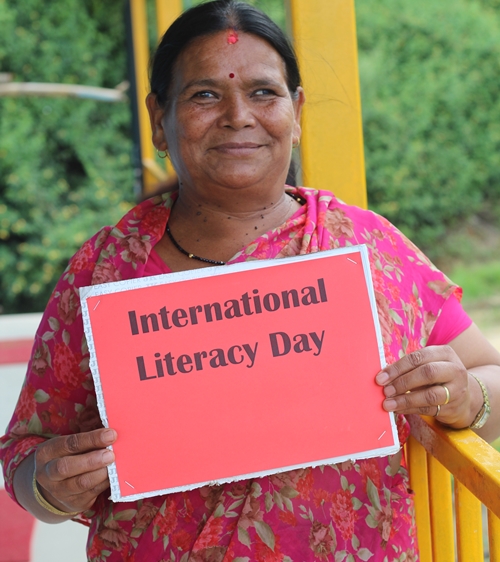"Before, I did not know how to read and write. I studied in the [Community Learning Center] literacy class, and now I can read and write in Nepali." These are the words of Chhalmaya Shrestha, from Dakshinkali. She is one of many learners in Nepal who has become literate through one of the country's 2,151 Community Learning Center (CLCs). These community-based educational institutions work outside the formal system and provide lifelong learning opportunities to marginalized communities. CLCs are key to driving up Nepal's literacy levels as they can reach those who live in rural, mountainous locations which have poor access to formal education institutions. They also play an important role in ensuring the continuation of education during COVID-19 related disruptions.

Chhalmaya Shrestha learned how to read and write at Shikharapur Community Learning Center.
Over the last three decades, Nepal's literacy rates in over 15-year-olds have been steadily improving, rising from 21% to 68% (UIS data, 2018). To continue this momentum, since 2016 UNESCO, through the Capacity Development for Education (CapED) Programme, has been working alongside the Government with a focus on literacy. The Programme supports CLCs with the aim to ensure that their programmes are relevant to the community and are in line with the policies and plans at all levels. In parallel, CapED has supported the Government to develop a lifelong learning policy framework which will guide local laws and provide harmonized and effective learning opportunities throughout the country. One of the key aspects of CapED's intervention is to take into consideration the gender divide, as in Nepal 79% of men can read and write compared with 60% of women.
In celebration of this year's International Literacy Day 2021, UNESCO held a series of workshops for CLCs across all seven of Nepal's provinces. The workshops reached over 300 CLC facilitators and developed the capacities of local government representatives, and provincial and local government education officials. The workshops build on previous UNESCO trainings and covered topics such as financial literacy, resource management, and empowering women, and in keeping with International Literacy Day's theme for 2021 - narrowing the digital divide - participants will also be taught how to use digital technology to develop literacy skills.

Niroj Shrestha, a manager of Shikharapur CLC worked to ensure learners continued their education during the COVID-19 pandemic
One of the beneficiaries of the training is Niroj Shrestha, a manager of Shikharapur CLC. He explains that during the COVID-19 pandemic his CLC played a role in ensuring the continuation of formal education by providing local children with access to computers and internet so they could partake in the national alternative learning programme during school closures. Niroj noted that the CLC also continued to offer adult education courses during the pandemic. For example, one of his students, Amar Praja, who has so far progressed from Grade 8 to 10 through an open education programme (a governmental accelerated learning programme) offered by the CLC was able to continue studying online. "My message to learners whose education was disrupted during the pandemic is that we should continue our education whatever hurdles and problems we might face."
You can find out more about how UNESCO supports adult learners through CLCs in Nepal in this video. These activities are implemented under UNESCO's Capacity Development for Education (CapED) Programme supported by Finland, Iceland, Norway, Sweden and Dubai Cares."






